|
ENTERED APPRENTICE
CHAPTER III
the masonic manual
robert macoy
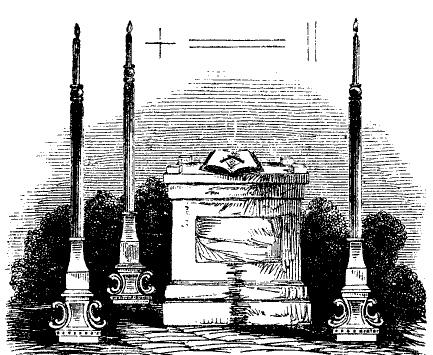
The first step taken by a candidate, on entering a Lodge of Freemasons,
teaches him the pernicious tendency of infidelity, and shows him that the
foundation on which Masonry rests, is the belief and acknowledgment of a
Supreme being; that in Him alone a sure confidence can be safely placed to
protect his steps in all the dangers and difficulties he may be called to
encounter in his progress through life; it assures him that, if his faith be well founded
in that Being, he may confidently pursue his course without fear and
without danger.
Masonry was originally an operative society, and in that form those who
worked as ENTERED APPRENTICES, were styled the first class; but in
Speculative or Free-masonry, the degree of which we are now treating is
regarded as the first of the order. Its reception places the noviciate in
possession of the masonic alphabet, and discloses to him the fundamental
principles of this time-honored institution. It is divided into three
sections, viz: 1st. The ceremony; 2d. Its moral, and 3d. Its necessity and
consistency.
A full and perfect knowledge of this section is indispensably necessary
to every Mason, who would be serviceable to the Institution, and would
avail himself of its privileges and its enjoyments.
"Vouchsafe thine aid, Almighty father of the Universe, to this our
present convention; and grant that this candidate for Masonry may dedicate
and devote his life to thy service, and become a true and faithful Brother
among us. Endue him with a competency of thy divine Wisdom, that by the
influence of the pure principles of our Order, he may the better be
enabled to display the beauties of holiness, to the honor of thy holy
name. Amen Response - "So move it
be."
"Behold! how good and how pleasant it is fo brethren to dwell together
in unity:
" It is like the precious ointment upon the head that ran down upon the
beard, even Aaron's beard that went down to the skirts of his garment:
"As the dew of Hermon, and as the dew that descended upon the mountains
of Zion: for there the Lord commanded the blessing, even life for
evermore."
Music - "Auld Lang Syne."
Behold! how pleasant and how good,
For brethren such as we,
Of
the "Accepted" brotherhood
To dwell in unity!
'T is like the oil on
Aaron's head
Which to his feet distils;
Like Hermon's dew so richly
shed
On Zion's sacred hills
For there the Lord of light and love
A blessing sent with
power;
Oh, may we all this blessing prove,
E'en life
forevermore:
On Friendship's altar rising here
Our hands now
plighted be,
To live in love with hearts sincere,
in peace and
unity.
It is the duty of the Master of the Lodge, as one of the precautionary
measures of initiation, to explain to the candidate the nature and design
of the Institution. And while he informs him that it is founded on the
purest principles of virtue; that it possesses great and invaluable
privileges, and that in order to secure those privileges to worthy men,
and worthy men alone, voluntary pledges of fidelity are required. He will
at the same time assure him that nothing will be expected of him
incompatible with his civil, moral or religious duties.
That ancient and spotless ensign of Masonry, the LAMB-SKIN or WHITE
APRON, is presented in behalf of the Lodge and the fraternity in
general.
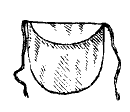 "It is an emblem of
innocence, and the badge of a Mason; more ancient than the golden fleece,
or Roman eagle; more honorable than the star and garter, or any other
order that can be conferred upon the candidate at the time of his
initiation, or at any future period. by king, prince, potentate, or any
other person, except he be a Mason." * * * It is hoped he will
wear it with pleasure to himself and honor to the fraternity. "It is an emblem of
innocence, and the badge of a Mason; more ancient than the golden fleece,
or Roman eagle; more honorable than the star and garter, or any other
order that can be conferred upon the candidate at the time of his
initiation, or at any future period. by king, prince, potentate, or any
other person, except he be a Mason." * * * It is hoped he will
wear it with pleasure to himself and honor to the fraternity.
In
the course of this section is exhibited a beautiful and impressive
illustration of the first, and one of the grand principles of the
institution; and concludes with a moral application of
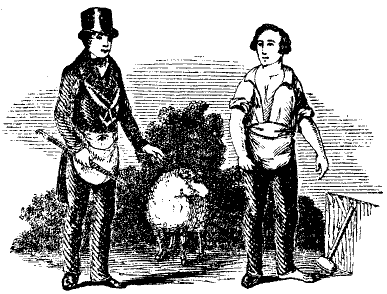
"The twenty-four inch gauge is an instrument used by operative
masons to measure and lay out their work; but we, as free and accepted
masons, are taught to make use of it for the more noble and glorious
purpose of dividing our time. It being divided into twenty-four equal
parts, is emblematical of the twenty-four hours of the day, which we are
taught to divide into three equal parts; whereby are found eight hours for
the service of GOD, and a distressed worthy brother; eight for our usual
vocations; and eight for refreshment and sleep.
"The common gavel is an instrument made use of by operative
masons to break off the corners of rough stones, the better to fit them
for the builder's use; but we, as free and accepted masons, are taught to
make use of it for the more noble
and glorious purpose of divesting our hearts and consciences of all the
vices and superfluities of life; thereby fitting our minds as living
stones for that spiritual building, that house not made with hands,
eternal in the
heavens."
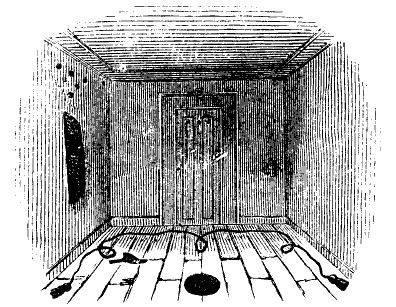
This section is one of vital importance, not only to the candidate, but
to the craft generally, and should be properly understood by every
presiding officer; as all ceremonies would appear light and frivolous,
unless accompanied by those moral lessons and fraternal impressions which
they are intended so strongly to impress on the minds of all who pass
through or witness them, that neither time nor circumstance can eradicate
them from the memory.
Every candidate, at his initiation, is presented with a lamb-skin,
or white apron.
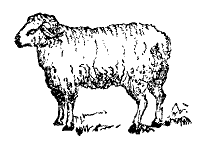 "The LAMB has, in all
ages, been deemed an emblem of innocence; the lamb-skin is
therefore to remind him of that purity of life and rectitude of conduct,
which is so essentially necessary to his gaining admission into the
Celestial Lodge above, where the Supreme Architect of the universe
presides." "The LAMB has, in all
ages, been deemed an emblem of innocence; the lamb-skin is
therefore to remind him of that purity of life and rectitude of conduct,
which is so essentially necessary to his gaining admission into the
Celestial Lodge above, where the Supreme Architect of the universe
presides."
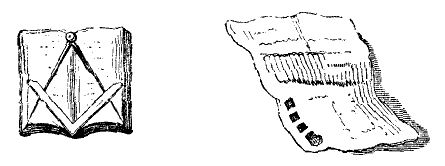
This section fully explains the manner of constituting, and the proper
authority for holding a Lodge. Here also, we learn where Lodges were
anciently held; their form, support, covering, furniture, ornaments,
lights and jewels; how situated, and to whom dedicated, as well in
former times as at present.
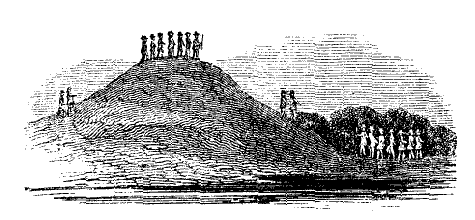
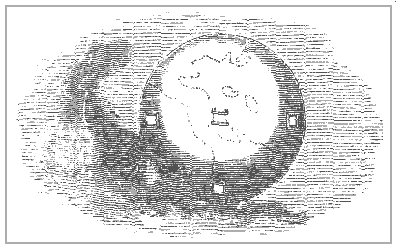
Its form is * * * *. Its dimensions from east to west,
embracing every clime between north and south; in fact its universal chain
of friendship encircles every portion of the human family, and beams
wherever civilization extends
* * * *
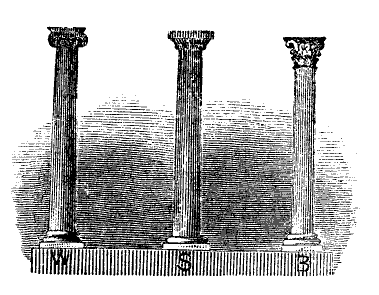
The Masonic Lodge, bounded only by the extreme points of the compass,
the highest heavens, and the lowest depth of the central abyss, is
metaphorically supported by three great pillars, which are
denominated WISDOM, STRENGTH and BEAUTY; because there should be
wisdom to contrive, strength to support, and beauty
to adorn all great and important undertakings. The universe is the temple
of the DEITY whom we serve; Wisdom, Strength and Beauty are about his
throne as pillars of his work; for his wisdom is infinite, his strength is
omnipotence, and his beauty shines forth through all his creation in
symmetry and order.
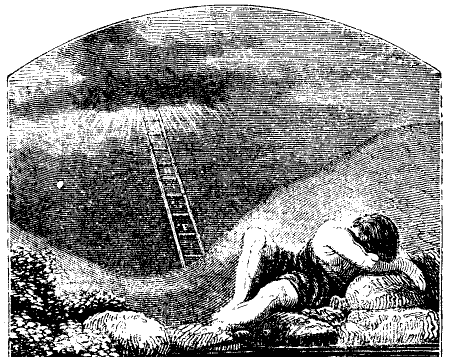
Its COVERING is no less than the clouded canopy or starry-decked
heaven, where all good Masons hope at last to arrive, by the aid of that
theological ladder, which Jacob, in his vision, saw extending from earth
to heaven; the three principal rounds of which are denominated
FAITH, HOPE and CHARITY; which admonish us to have faith in GOD,
hope in immortality, and charity to all mankind. The
greatest of these is CHARITY, for our faith may be lost in sight;
hope ends in fruition; but charity extends beyond the grave,
through the boundless realms of
eternity."
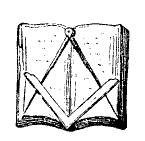 Every well-governed
lodge is furnished with the Holy Bible, the Square and the
Compasses. Every well-governed
lodge is furnished with the Holy Bible, the Square and the
Compasses.
The Bible is dedicated to the service of God, because it is the
inestimable gift of god to man, * * * * ; The square to the
Master, because it is the propper Masonic emblem of his office; and the
compasses to the craft, because, by a due attention to its use, they are
taught to circumscribe their desires, and keep their passions within due
bonds. *)
*) The following appropriate illustration of the * * * of
masonry, may be given with beautiful effect:
"As more immediate guides for a Free-mason, the lodge is furnished with
unerring rules, whereby he shall form his conduct. The book of the law is
laid before him, that he may not say, through ignorance he erred; wahtever
the Great Architect of the world hath dictated to mankind, as the mode in
which he would be served, and the path in which to tread is to obtain his
approbation; whatever precepts he hath administered, and with whatever
laws he hath inspired the sages of old, the same are faithfully comprised
in the book of the law of masonry. That book reveals the duties which the
Great Master of all exacts from us; open every eye, comprehensible to
every mind; then who shall say among us that he koweth not the acceptable
service!"
"The rule, the square, and the compasses, are emblematical of the
conduct we should pursue in society. To observe punetuality in all our
engagements, faithfully and religiously to discharge these important
obligation, which we owe to GOD and our neighbor; to be upright in all our
dealings: to hold the scale of justice in equal poise; to square our
action by unerring rule of GOD's sacred word; to keep within compass and
bounds with all mankind, particularly with a brother; to keep within
bounds those unruly passions which oftentimes interfere with the
enjoyments of society, and degrade both the man and the Freemason: to
recal to our minds, that in the great scale of existence, the whole family
of mankind are upon a level with each other, and that the only question of
preference among Free-masons should be, who is most wise, who is most
good! For the time will come, and non of us know how soon, when death, the
great leveller of all human geratness, will rob us our distinctions, and
bring us to a level with the
dust."
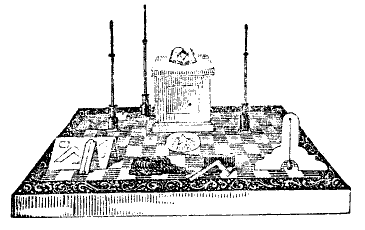
The ornaments of a Lodge are a representation of the Mosaic
pavement, which fobrmed the groundfloor of King Solomon's Temple; the
beautiful tesselated border (the border that surrounded it), and
the blazing star in the centre, the S.: S.: or Holy of
Holies.*)
The Mosaic pavement is emblematical of human life, checkered with good
and evil; the indented tessel, or tesselated border, of the
manifold blessings and comforts which constantly surround us, and which we
hope to enjoy by a firm reliance on Divine Providence, which is
hieroglyphically represented by the blazing star in the centre. +)
*) Cunningham.
+) 'As the steps of man are trod in the various snd uncertain
intcidents of life, as our days are checkered with a strange contrariety
of events, and our passage through this existence, though sometimes
attended with prosperous circustances, is often beset by a multitude of
evils; hence is the lodge furnished with Mosaic work, to remind us of the
precariousness of our state on earth; to-day, our feet tread in
prosperity; to-morrow, we totter on the uneven paths of weakness,
temptation and ativersity. Whilst this emblem is before us, we are
instructed to boast of nothing; to have compassion, and give aid to them who are in adversity; to walk uiprightly, and with humility; for such
is this existence, that there is no station in which pride can be stably
founded - all men in birth and in the grave are on a level. Whilst we
tread on this Mosaic work, let our ideas return to the original which it
copies; and let every mason act as the dictates of reason prompt him to
live in brotherly love."
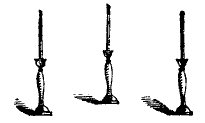
The moveable and immoveable jewels also claim our
attention.
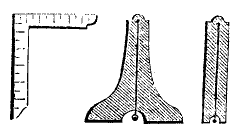
The immoveable jewels are the ROUGH ASHLER, the PERFECT ASHLER,
and the TRESTLE BOARD.
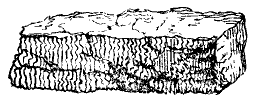 The rough
ashler is a stone in its rude and natural state, as taken from the
quarry: the perfect ashler, one prepared by the workmen, to be
adjusted by the working tools of the fellowcraft; and the trestle
board is for the master workman to draw his designs upon. The rough
ashler is a stone in its rude and natural state, as taken from the
quarry: the perfect ashler, one prepared by the workmen, to be
adjusted by the working tools of the fellowcraft; and the trestle
board is for the master workman to draw his designs upon.
By the rough ashler we are reminded of our rude and imperfect
state by nature;
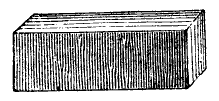 by the
perfect ashIer, of that state of perfection at which we hope to
arrive by a virtuous education, our own endeavors, and the blessing of
DEITY. And as the operative workman erects his temporal building in
accordance with the designs laid down upon the trestle board, by
the master workman, by the
perfect ashIer, of that state of perfection at which we hope to
arrive by a virtuous education, our own endeavors, and the blessing of
DEITY. And as the operative workman erects his temporal building in
accordance with the designs laid down upon the trestle board, by
the master workman,
 so
should we, both operative and speculative, endeavor to erect our spiritual
building in accordance with the designs laid down by the Supreme Architect
of the universe, in the great book of nature and revelation, which is our
spiritual, moral and masonaic trestle-board. so
should we, both operative and speculative, endeavor to erect our spiritual
building in accordance with the designs laid down by the Supreme Architect
of the universe, in the great book of nature and revelation, which is our
spiritual, moral and masonaic trestle-board.
Lodges are situated due east and west.
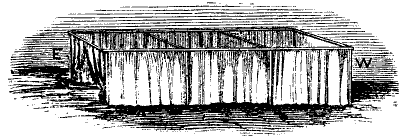
Lodges in ancient times were dedicated to King Solomon * * *,
and continued to be so dedicated until after the crusades. Among the
various orders of knights engaged in those chivalric wars, none were more
conspicuous than the magnanimous
order of the Knights of St. John. Many brethren the ancient craft also went
forth to aid in redeeming the sepulchre of the Saviour, from the hands of
the infidel; between these and the knights of St. John, there existed a
reciprocal feeling of brotherly love. On the plains of Jerusalem,
they entered into a solemn compact of friendship, and it was mutually
agreed between them that henceforth all lodges, whose members acknowledged
the divinity of Christ, should be dedicated to St. John the Baptist, and
St. John the Evangelist, who were two eminent Christian patrons of
Freemasonry.
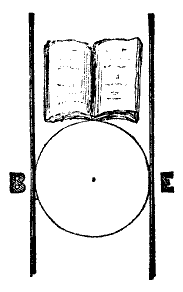
From that time, therefore, there has been represented, in
every well governed Lodge, a certain POINT WlTHIN A CIRCLE, embordered by
two perpendicular parallel lines, representing those two saints, upon the
vertex of the circle rests the Holy Scriptures. The point within
the circle represents an individual brother; the circle is the boundary
line, beyond which he is never to suffer his passions to betray him. In
going round this circle, he must necessarily touch upon these two lines,
as well as the Holy Scriptures; which teaches us that while a Mason keeps
himself circumscribed within their precepts, it is impossible that he
should materially err.
The principal tenets of our profession are threefold, including the
inculcation and practice of those truly commendable virtues, BROTHRLY -
LOVE, RELIEF and TRUTH
OF BROTHERLY LOVE
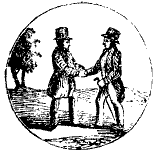 By the exercise of
Brotherly Love, we are taught to regard the whole human species as one
family; the high, the low; the rich, the poor; who, as created by one
Almighty Parent and in habitants of the same planet, are to aid, support
and protect each other. On this principle, Masonry unites men of every
country, sect and opinion, and conciliates true friendship among those who
might otherwise have remained at a perpetual distance. By the exercise of
Brotherly Love, we are taught to regard the whole human species as one
family; the high, the low; the rich, the poor; who, as created by one
Almighty Parent and in habitants of the same planet, are to aid, support
and protect each other. On this principle, Masonry unites men of every
country, sect and opinion, and conciliates true friendship among those who
might otherwise have remained at a perpetual distance.
OF RELIEF
To relieve the distressed, is a duty incumbent on all men; but
particularly on Masons, who are linked together by an indissoluble chain
of sincere affection. To soothe the unhappy; to sympathize with their
misfortunes; to compassionate their miseries, and to restore peace to
their troubled minds, is the great aim we have in view. On this basis, we
form our friendships and establish our
connections
OF TRUTH.
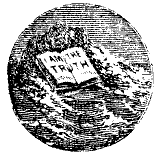 Truth is a divine
attribute, and the foundation of every virtue. To be good and true, is the
first lesson we are taught in masonry. On this theme we contemplate, and
by its dictates endeavor to regulate our conduct: hence, while influenced
by this principle, hypocrisy and deceit are unknown among us; sincerity
and plain dealing distinguish us; and the heart and tongue join in
promoting each other's welfare, and rejoicing in each other's
prosperity. Truth is a divine
attribute, and the foundation of every virtue. To be good and true, is the
first lesson we are taught in masonry. On this theme we contemplate, and
by its dictates endeavor to regulate our conduct: hence, while influenced
by this principle, hypocrisy and deceit are unknown among us; sincerity
and plain dealing distinguish us; and the heart and tongue join in
promoting each other's welfare, and rejoicing in each other's
prosperity.
The Four Cardinal Virtues explained.
OF FORTITUDE.
FORTITUDE is that noble and steady purpose of the mind, whereby we are
enabled to undergo any pain, peril or danger, when prudentially deemed
expedient. This virtue is equally distant from rashness or cowardice; and
should be deeply impressed upon the mind of every mason, as a safeguard or
security against any illegal attack that may be made, by force or
otherwise, to extort from him any of those valuable secrets with which he
has been so solemnly intrusted, and which were emblematically represented
upon his first admission into the Lodge.
OF PRUDENCE.
PRUDENCE teaches us to regulate our lives and actions agreeably to the
dictates of reason, and is that habit by which we wisely judge, and
prudentially determine, on all things relative to our present, as well as
to our future happiness. This virtue should be the peculiar characteristic
of every Mason, not only for the government of his conduct while in the
Lodge, but also when abroad in the world. It should be particularly
attended to, in all strange and mixed companies, never to let fall the
least sign, token or word, whereby the secrets of Masonry might be
unlawfully obtained. * * * * * *
OF TEMPERANCE.
TEMPERANCE is that due restraint upon our affections and passions,
which renders the body tame and governable, and frees the mind from the
allurements of vice. This virtue should be the constant practice of every
Mason; as he is thereby taught to avoid excess, or contracting any
licentious or vicious habit, the indulgence of which might lead him to
disclose some of those valuable secrets, which he has promised to conceal and never reveal,
and which would consequently subject him to the contempt and detestation
of all good Masons. * * * * * *
OF JUSTICE.
JUSTICE is that standard, or boundary of right, which enables us to
render unto every main his just due, without distinction. This virtue is
not only consistent with divine and human laws, but is the very cement and
support of civil society; and as justice in a great measure constitutes
the really good man, so should it be the invariable practice of every
Mason, never to deviate from the minutest principles thereof.
* * * * *
The illustration of these virtues is accompanied with some general
observations peculiar to Masons Due veneration is also paid to our ancient
patrons.
The earth is that alone of all the elements that has never
proved unfriendly to man; the bodies of water deluge him with rain;
oppress him with hail, and drown him with inundations. The air rushes in
storms, prepares the tempest, and lights up the volcano; but the earth,
ever kind and indulgent, is found subservient to his wishes; though constantly harassed, more to furnish the luxuries than the necessities of
life, she never refuses her accustomned yield; spreading his path with
flowers, and his table with plenty; though she produces poison, still she
supplies the antidote, and returns, with interest, every good committed to
her care; and when at last he is called upon to pass through the "dark
valley of the shadow of Death," she once more receives him, and piously
covers his remains within her bosom; this admonishes us that from it we
came and to it we must shortly return.
Such is the arrangement of the different sections in the first lecture,
which, with the forms adopted at the opening and closing of a Lodge,
comprehends the first degree of Masonry.
BROTHER: - As you are now introduced into the first principles of
Masonry, I congratulate you on being accepted into this ancient and
honorable order: - ancient, as having subsisted from time immemorial, and
honorable, as tending in every particular, so to render all men who will
be conformable to its precepts. No institution was
ever raised on a better principle, or more solid foundation; nor were ever
more excellent rules and useful maxims laid down, than are inculcated in
the several Masonic lectures. The greatest and best of men, in all ages,
have been encouragers and promoters of the art; and have never deemed it
derogatory to their dignity, to level themselves with the fraternity,
extend their privileges, and patronize their assemblies. There are three
great duties, which, as a Mason, you are charged to inculcate - to GOD,
your neighbor, and yourself. To GOD, in never mentioning his name, but
with that reverential awe which is due from a creature to his CREATOR; to
implore his aid in all your laudable undertakings, and to esteem him as
the chief good; - to your neighbor, in acting upon the square, and doing
unto him as you wish he should do unto you; and to yourself, in avoiding
all irregularity and intemperance, which may impair your faculties, or
debase the dignity of your profession. A zealous attachment to these
duties, will insure public and private esteem.
In the state, you are to be a quiet and peaceful citizen, true to your
government, and just to your country; you are not to countenance
disloyalty or rebellion, but patiently submit to legal authority, and
conform with cheerfulness to the government of the country in which you
live. In your outward demeanor, be particularly careful to avoid censure
and reproach.
Although your frequent appearance at our regular meetings is earnestly
solicited, yet it is not meant that masonry should interfere with your
necessary vocations; for these are on no account to be neglected; neither
are you to suffer your zeal for the institution to lead you into argument
with those who, through ignorance, may ridicule it.
At your leisure hours, that you may improve in masonic knowledge, you
are to converse with well informed brethren, who will be always as ready to
give, as you will be to receive, instruction.
Finally, keep sacred and inviolable the mysteries of the order; as
these are to distinguish you from the rest of the community, and mark your
consequence among masons. If, in the circle of your acquaintance, you find
a person desirous of being initiated into masonry, be particularly careful
not to recommend him, unless you are convinced he will conform to our
rules; that the honor, glory and reputation of the institution, may be
firmly established, and the world at large convinced of its good
effects.
back to top |
![]()






 "It is an emblem of
innocence, and the badge of a Mason; more ancient than the golden fleece,
or Roman eagle; more honorable than the star and garter, or any other
order that can be conferred upon the candidate at the time of his
initiation, or at any future period. by king, prince, potentate, or any
other person, except he be a Mason." * * * It is hoped he will
wear it with pleasure to himself and honor to the fraternity.
"It is an emblem of
innocence, and the badge of a Mason; more ancient than the golden fleece,
or Roman eagle; more honorable than the star and garter, or any other
order that can be conferred upon the candidate at the time of his
initiation, or at any future period. by king, prince, potentate, or any
other person, except he be a Mason." * * * It is hoped he will
wear it with pleasure to himself and honor to the fraternity.

 "The LAMB has, in all
ages, been deemed an emblem of innocence; the lamb-skin is
therefore to remind him of that purity of life and rectitude of conduct,
which is so essentially necessary to his gaining admission into the
Celestial Lodge above, where the Supreme Architect of the universe
presides."
"The LAMB has, in all
ages, been deemed an emblem of innocence; the lamb-skin is
therefore to remind him of that purity of life and rectitude of conduct,
which is so essentially necessary to his gaining admission into the
Celestial Lodge above, where the Supreme Architect of the universe
presides."




 Every well-governed
lodge is furnished with the Holy Bible, the Square and the
Compasses.
Every well-governed
lodge is furnished with the Holy Bible, the Square and the
Compasses.


 The rough
ashler is a stone in its rude and natural state, as taken from the
quarry: the perfect ashler, one prepared by the workmen, to be
adjusted by the working tools of the fellowcraft; and the trestle
board is for the master workman to draw his designs upon.
The rough
ashler is a stone in its rude and natural state, as taken from the
quarry: the perfect ashler, one prepared by the workmen, to be
adjusted by the working tools of the fellowcraft; and the trestle
board is for the master workman to draw his designs upon. by the
perfect ashIer, of that state of perfection at which we hope to
arrive by a virtuous education, our own endeavors, and the blessing of
DEITY. And as the operative workman erects his temporal building in
accordance with the designs laid down upon the trestle board, by
the master workman,
by the
perfect ashIer, of that state of perfection at which we hope to
arrive by a virtuous education, our own endeavors, and the blessing of
DEITY. And as the operative workman erects his temporal building in
accordance with the designs laid down upon the trestle board, by
the master workman,
 so
should we, both operative and speculative, endeavor to erect our spiritual
building in accordance with the designs laid down by the Supreme Architect
of the universe, in the great book of nature and revelation, which is our
spiritual, moral and masonaic trestle-board.
so
should we, both operative and speculative, endeavor to erect our spiritual
building in accordance with the designs laid down by the Supreme Architect
of the universe, in the great book of nature and revelation, which is our
spiritual, moral and masonaic trestle-board.

 By the exercise of
Brotherly Love, we are taught to regard the whole human species as one
family; the high, the low; the rich, the poor; who, as created by one
Almighty Parent and in habitants of the same planet, are to aid, support
and protect each other. On this principle, Masonry unites men of every
country, sect and opinion, and conciliates true friendship among those who
might otherwise have remained at a perpetual distance.
By the exercise of
Brotherly Love, we are taught to regard the whole human species as one
family; the high, the low; the rich, the poor; who, as created by one
Almighty Parent and in habitants of the same planet, are to aid, support
and protect each other. On this principle, Masonry unites men of every
country, sect and opinion, and conciliates true friendship among those who
might otherwise have remained at a perpetual distance. Truth is a divine
attribute, and the foundation of every virtue. To be good and true, is the
first lesson we are taught in masonry. On this theme we contemplate, and
by its dictates endeavor to regulate our conduct: hence, while influenced
by this principle, hypocrisy and deceit are unknown among us; sincerity
and plain dealing distinguish us; and the heart and tongue join in
promoting each other's welfare, and rejoicing in each other's
prosperity.
Truth is a divine
attribute, and the foundation of every virtue. To be good and true, is the
first lesson we are taught in masonry. On this theme we contemplate, and
by its dictates endeavor to regulate our conduct: hence, while influenced
by this principle, hypocrisy and deceit are unknown among us; sincerity
and plain dealing distinguish us; and the heart and tongue join in
promoting each other's welfare, and rejoicing in each other's
prosperity.